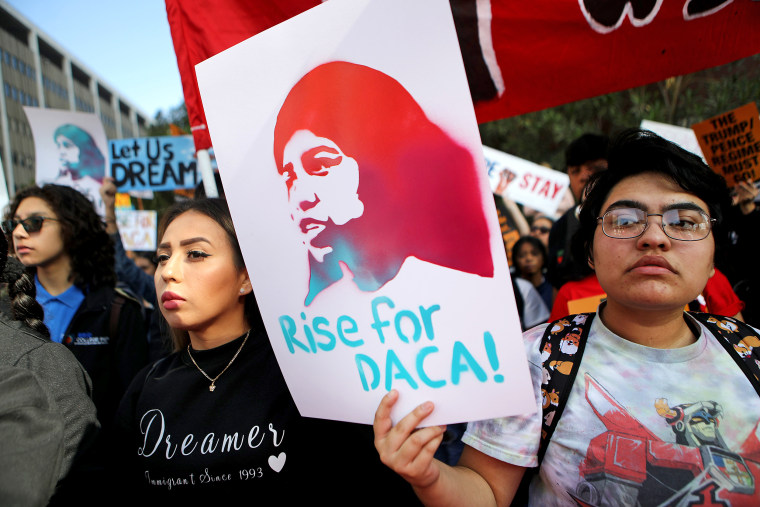The U.S. Supreme Court is considering whether President Donald Trump can go forward with his plans to end the Deferred Action for Childhood Arrivals, or DACA, program. The Obama-era program has allowed almost 700,000 young adults without legal status but who have been in the United States since they were children to work and study without fear of deportation.
If the Supreme Court rules in Trump's favor, the question is what happens to these hundreds of thousands of young adults.
Q: Will everyone be immediately deported?
A: Deportation is the biggest fear of DACA recipients, as Missael García, 29, a father of a U.S.-born two-year-old, recently told NBC News. "Ending DACA would be a big blow for my family, it would be a complete family separation," he said.
Legal immigration experts say it’s highly unlikely that everyone would be deported immediately. The Supreme Court’s ruling, of course, determines the next steps. But if Trump prevails, the administration is likely to impose a gradual shutdown of DACA similar to what it tried before the phase-out was blocked by lower courts.
Immigration attorneys and experts expect the administration to allow the enrollments to expire if Trump prevails.
DACA is granted for two years, so DACA recipients have different expiration dates for their benefits. That means if the program is shut down, people will lose their protection from deportation and their work permission at different times.
Between Oct. 1 and June 30, 2020, 232,000 individuals’ DACA is set to expire, although a third, 75,400 people, have applied for renewals, according to the Center for American Progress. The Supreme Court is expected to rule by the end of June.
Thomas Saenz, president and general counsel of the Mexican American Legal Defense and Educational Fund, says that DACA recipients are entitled to go to court and try to stop removal or deportation.
If that happens, their cases would join backlogged immigration dockets and they could remain in the country until they get their day in court.
The administration could choose to end work permits granted to DACA recipients, Saenz said.
But Jorge Loweree, director of policy at the American Immigration Council, added that work permits also have expiration dates and to keep all of them from being used once they are canceled, the government would have to physically collect them.
“If DACA is eliminated, it will create a crisis, for lack of a better term, and it’s a political crisis that very few people will be able to ignore,” Loweree said.
Q: Are there other ways some could stay in the country?
A: Some DACA recipients have been able to become legal permanent residents and eventually citizens through marriage to a citizen or a legal permanent resident.
This path is easier for some immigrants than others, depending on whether they entered the country legally or not. Sorting out the details often takes a lawyer, which not all DACA enrollees can afford.
DACA recipients could seek employment visas or other legal ways to remain, but Loweree said if the vast majority of recipients had a path to permanent legal status, they would have taken advantage of it by now.
Q: Even if the Supreme Court rules in Trump’s favor, is there a way to save DACA?
A: The Democrat-controlled House has passed legislation protecting DACA recipients, as well as young immigrants often referred to as Dreamers and immigrants with Temporary Protected Status. A bipartisan Senate bill has also been offered, but neither the House nor the Senate bills have gone anywhere in the Republican-controlled Senate.
Trump and Republican legislators could feel a business backlash since many of the DACA recipients are working and have been for years. According to a recent Harvard University study, the DACA program has bolstered the national workforce and contributed billions to the economy.
DACA enjoys broad support from the business and the academic communities, since DACA has enabled more young adults to attend college. Apple CEO Tim Cook filed a brief with the Supreme Court supporting DACA, an unprecedented move for senior Apple officials.
The 2020 election could play a role — in an election year, how the public response plays out could influence whether the opposing parties try to find a legislative solution in Congress. Most polls show a majority of Americans support DACA.
Follow NBC Latino on Facebook, Twitter and Instagram.


